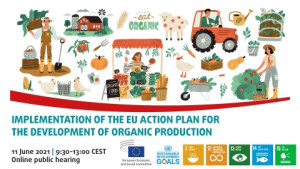Claudio Serafini, the Director of Organic Cities Network Europe, is to speak at an online public hearing organised by the European Economic and Social Committee (EESC) on 11 June 2021 on the ongoing preparation work for its opinion Action Plan for the development of EU organic production. The aim of the online conference is to highlight stakeholders’ views on the proposed EU Action Plan and its implementation.
The EU Action Plan foresees, among others, the stimulation of production, the development of new markets (including sustainable food public procurements), ensuring a level playing field for imports and improving the sustainability of the organic food chain. The public event will be used to discuss how to transform these targets into on-the-ground strategies related to organic production and consumption, and to showcase challenges as well as success stories from different regions.
In his presentation, “Success stories of European cities: Organic Cities Network Europe and the Case of Florence”, Claudio Serafini will focus on the topic of consumption and the important role the cities and municipalities play in promoting and ensuring that future generations have access to a healthy, organic diet. Claudio Serafini: “Florence is the perfect example of a city that effortlessly combines tradition and modernity. A city renowned for its historical contribution to European culture is also at the forefront of the drive towards an organic future.”
Hosted and moderated by Andreas Thurner, rapporteur for the EESC opinion on the Action Plan for the development of EU organic production and with keynote speeches by Elena Panichi, Head of Unit “Organics”, DG Agriculture, European Commission (“Ambition of the Action Plan for the development of EU organic production”) and Mazaly Aguilar, Member of the European Parliament, Vice-Chair of the AGRI committee: (“The future of organic production in the EU”), the public hearing will open up to a series of panel discussions with a number of stakeholders.
Objectives of the EU Action Plan
 The climate and biodiversity challenges need to be tackled in all sectors, while the post-Covid recovery represents an opportunity to “build back better” towards a sustainable future. In this context, more sustainable, fairer and inclusive food systems are needed to contribute to a wellbeing economy that works for people and planet.
The climate and biodiversity challenges need to be tackled in all sectors, while the post-Covid recovery represents an opportunity to “build back better” towards a sustainable future. In this context, more sustainable, fairer and inclusive food systems are needed to contribute to a wellbeing economy that works for people and planet.
Organic agriculture is part of the European Green Deal: through the Farm to Fork and the Biodiversity strategies, the European Commission has committed to reach at least 25% of the EU’s agricultural land under organic farming by 2030and a significant increase in organic aquaculture, both to:
- improve the sustainability of the food system, and to
- revert biodiversity loss.
To meet this ambitious target, the Commission published an action plan (2021 – 2027) to stimulate both supply and demand for organic products in the European Union.

